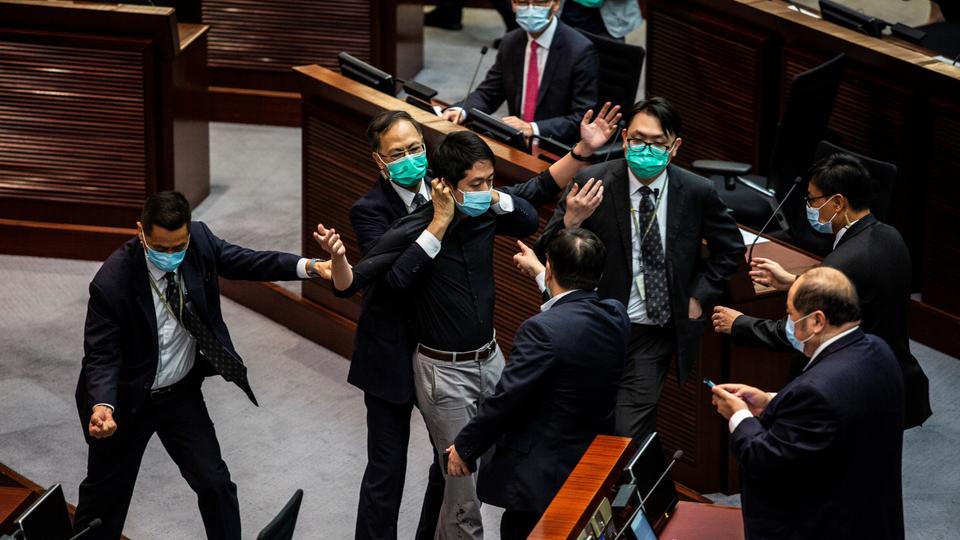Hong Kong lawmakers pass national anthem law

A few minutes every morning is all you need.
Stay up to date on the world's Headlines and Human Stories. It's fun, it's factual, it's fluff-free.
On Thursday, Hong Kong lawmakers passed a bill that criminalizes insult to March of the Volunteers – the Chinese national anthem. This is despite public widespread opposition and multiple attempts to disrupt the legislative proceedings.
Offenders who are found guilty of deliberate alteration of the national anthem, performing the anthem in a derogatory manner or insulting the song, risk fines of up to HK$50,000 (US$6,450) or three years of imprisonment.
The law is expected to come into effect on June 12 of this year. However, the definition of the terms “insult” and “derogatory” remain ambiguous, raising concerns that this may lead to disputes or arbitrary prosecution.
Democrats staged a last-minute protest on the day of the vote, which coincided with the June 4 anniversary of the Tiananmen Square massacre. A moment of silence was observed and signs were placed on desks reading, “Never forget June 4, the heart of the people will not die.”
In the final hours of the debate before voting, Democratic Party lawmakers Eddie Chu Hoidick and Raymond Chan Chichuen, rose from their seats and charged towards the podium.
They held signs reading, “Murderous states stink for eternity” before dropping containers of foul-smelling liquid on the floor which led to a three-hour suspension of the proceedings.
The two were removed from the premises and law enforcement officers and firefighters arrived shortly after to carry out an on-site investigation, citing concerns over the potential use of poisonous gases.
Upon resumption in another room, another Democratic Party lawmaker Ted Hui Chifung made an additional last-minute attempt to stall the vote, charging toward the podium and spilling a foul-smelling substance. The substance was later found to be a decayed potted plant.
Legislative Council President Andrew Leung Kwanyuen, called the lawmakers’ actions “irresponsible, childish and [a] suspected act of crime.” The debate was subsequently cut short and the bill was put to vote with all but one Democratic lawmaker refusing to take part in the ballot.
Reporters who congregated outside the government building questioned the legitimacy of the vote due to the shortened discussion periods.
Leung denied claims of illegitimacy citing the 17 meetings that had already taken place, shifting the blame onto lawmakers who would “resort to all sorts of means to block the passage of the bill.”
He explained, “I told members that I had scheduled 30 hours [to discuss the bill] so I think we worked according to the schedule.”
In previous discussions however, the pro-Democracy lawmakers raised a total of 21 amendments to the bill, including pushing for reduction or elimination of criminal liability for offenders. All were denied by the pro-Beijing camp, which possesses an insurmountable voting edge in the legislative council.
Rival camps have clashed several times in meetings leading up to the vote, with a few incidents descending into physical confrontations.
Democratic Party Leader Wu Chiwai argued that genuine respect for the anthem could not be mandated but must be earned. He expressed concern that “tough laws would only provoke greater social resistance to the authoritarian regime.
“You fail to touch the roots of the problem,” he said. “Are we going to see more and more draconian laws and harsher penalties?”
However, pro-Beijing lawmakers state that the bill is unrelated to the alleged infringement of individual rights.
“The law does not require you to express your love towards the nation, just to not insult it,” said pro-Beijing lawmaker Alice Mak Meikuen.
Her point was reiterated by the Secretary for Constitutional and Mainland Affairs Erick Tsang Kwokwai who stated, “As long as people don’t insult the anthem, they don’t need to worry about breaching the law.”
Tsang also argued that this bill is necessary to uphold the “one country, two systems” policy. “Only when people respect our country is it meaningful to talk about ‘two systems’.”
Meanwhile, as the Legislative Council members discussed the bill, protests against the bill flared up in multiple locations around Hong Kong, resulting in the arrest of over 360 people aged between 14 and 40 years old.
Have a tip or story? Get in touch with our reporters at tips@themilsource.com
Sign up for daily news briefs from The Millennial Source here!




Comments ()